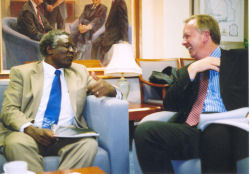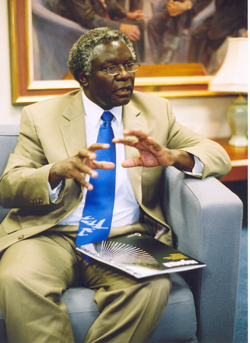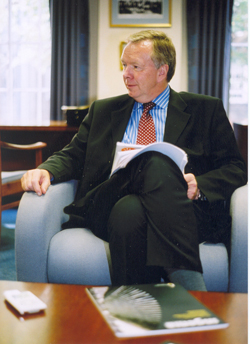Professor Calestous Juma delivered The Royal Academy of Engineering’s 2006 Hinton Lecture on ‘Redesigning African Economies’.



Professor Calestous is an internationally-recognised authority in the application of science and technology to sustainable development. Professor Peter Guthrie is a civil engineer, and Professor of Engineering for Sustainable Development here at the Department. Over 25 years ago he set up RedR (Registered Engineers for Disaster Relief, now RedR-IHE), supplying trained personnel for disaster relief at the request of charities, governments and non-governmental organisations. They talked in the Fellows’ Room of The Royal Academy of Engineering on the eve of the Hinton Lecture in October 2006.
PETER GUTHRIE: Professor Juma, can you outline what you plan to talk about in your Hinton Lecture?
CALESTOUS JUMA: The focus of my talk is on a new approach to Africa’s development that reflects the true character of the challenges facing the continent. I see those challenges as the need to improve the effectiveness of investments in the economic arena by focusing on continuous improvement. It is not possible to think about continuous improvement without some investment in scientific and technical competence. The reason I have focused the lecture on the role of infrastructure is because a large body of technical competence in economies diffuses from infrastructure investments. If a country is not investing in infrastructure projects, the chances are that it is not creating the foundations from which new technical skills will flow.
The idea is to take advantage of increased emphasis and interest in investment in infrastructure in Africa, and use it as a foundation for creating new technical skills that can be used and diffused in the economy.
It is evident that African economies are unlikely to grow if one is not able to move goods, services and ideas, but this ability is really a reflection of investment and infrastructure. That is what the paper is about.
PG: You talk about integrating Africa into the global economy, but it has some unique features and obviously a unique history. Its role and its relationship with the rest of the world is very different from South Asia or South East Asia, or South America.
CJ: Historically, Africa was defined as a supplier of raw materials, and as such, the infrastructure concerns were really about getting roads from the mines to the ports. It wasn’t intended to stimulate domestic industry.
Now there are two main issues. One is regional economic development, the argument that if you cannot trade regionally within the continent, you probably cannot trade internationally. The second issue is being able to integrate globally through trade, and that means redefining the place of Africa in the global economy through adding value to existing resources.
We are thinking about a new Africa that is a serious player in the global economy and that is why you see African presidents focusing on issues related to scientific and technological development.
An edited extract of the conversation on the role of engineering in international development was published in Ingenia the quarterly magazine of The Royal Academy of Engineering.

